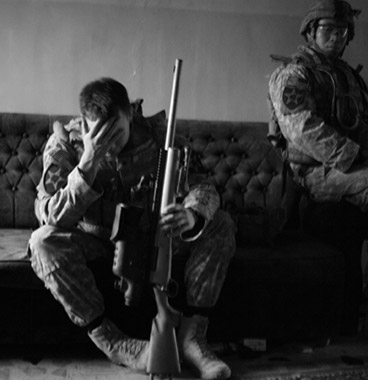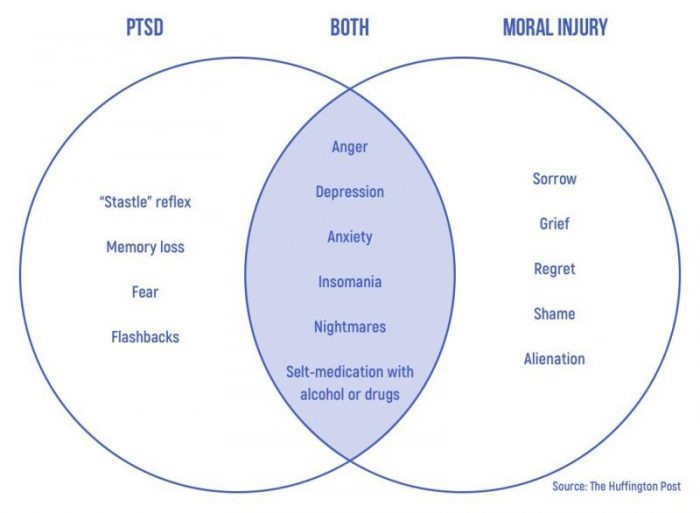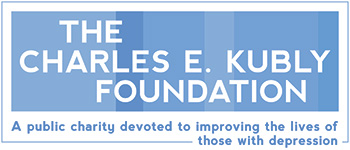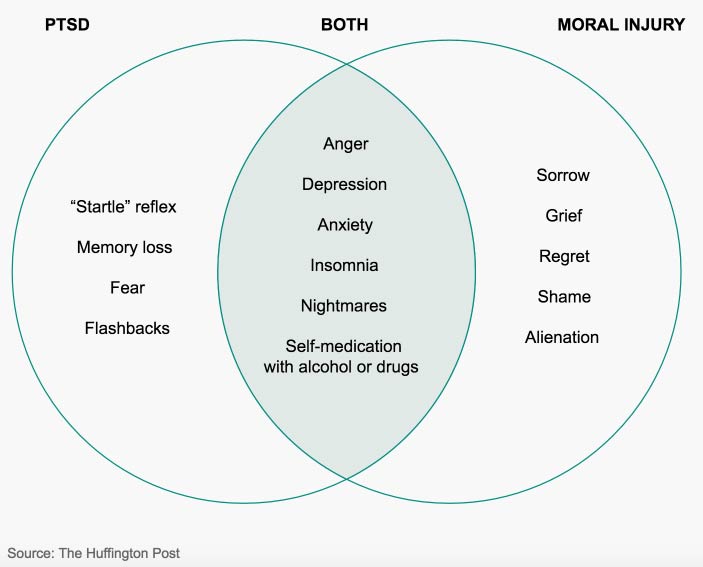“Almost Sunrise is a timely and groundbreaking look at what could be a missing piece of the puzzle—the true nature of the psychological wounds of returning soldiers known as ‘moral injury,’ and the undeniable potential power of meditation and nature therapy in helping veterans to reclaim their lives.” – Hollywood Glee
ALMOST SUNRISE is the first feature documentary film to identify Moral Injury and explore the veterans experience through the lens of this timely condition.
WHAT IS MORAL INJURY?
MORAL INJURY PANEL DISCUSSION
Dr. William Nash, Dr. Barbara Van Dahlen and Nancy Sherman discuss Moral Injuruy with veteran Tom Voss and director Michael Collins at AFI Docs Film Festival.
Moral injury is a relatively new concept and “involves psychological and spiritual wounds that result from experiences that conflict with one’s deeply held beliefs of right and wrong. This is not a mental disorder”, says Katinka Hooyer, PhD, also a character in Almost Sunrise.
Dr. Brett Litz, a pioneer in the study of moral injury, points out that, “The key precondition for moral injury is an act of transgression, which shatters moral and ethical expectations that are rooted in religious or spiritual beliefs, or culture-based, organizational, and group-based rules about fairness, the value of life…” The injury can arise in a variety of forms ranging from “….perpetrating, failing to prevent, bearing witness to, or learning about acts that transgress deeply held moral beliefs and expectations.”
Recently, researchers and therapists on the frontlines of veterans’ care have started to identify what may be a critical factor in the overall suicide crisis – a sort of “missing link” – a condition called “moral injury”.
I would bet anything, that if we had the wherewithal to do this kind of research we’d find that moral injury underlies veteran homelessness and suicide. – Dr. William Nash, Director of Psychological Health for the United States Marine Corps
MORAL INJURY IN THE CONTEXT OF WAR

Photo by Emmet Cullen
The consequences of violating one’s moral code, even if the act was necessary and unavoidable in that moment, can be very destructive. In these instances, self-judgment is at the core of moral injury. The killing of children and women, not being there for a battle buddy who lost their life or the incapacity to help injured civilians are common sources of moral pain that Veterans talk about.
Witnessing leaders and respected peers violate core values is a different form of moral conflict. Feelings of betrayal are at the root of these types of moral injury. Examples include being raped by fellow service members or witnessing the inhumane treatment of prisoners.
The stories that may provide a clue to moral injury are linked more to what service members have done or failed to do, not what was done to them. Feelings of guilt and shame, related to not living up to their military charge or failing to fulfill their own standards of right and wrong, are a strong sign of moral injury.
The emergence of moral injury has no particular timeline. There are life experiences that may trigger awareness of moral injuries. These experiences include changes in life stages, marriage, the birth of a child, and the loss of a relationship, the empathy of a stranger, the death of a loved one or even experiencing unconditional love.
MORAL INJURY VS PTSD
“The diagnosis of PTSD has been defined and officially endorsed since 1980 by the mental health community, and those suffering from it have earned broad public sympathy and understanding. Moral injury is not officially recognized by the Defense Department. But it is moral injury, not PTSD, that is increasingly acknowledged as the signature wound of this generation of veterans: a bruise on the soul, akin to grief or sorrow, with lasting impact on the individuals and on their families.”
– David Wood, A Warrior’s Moral Dilemma, Huffington Post (http://projects.huffingtonpost.com/projects/moral-injury)

Dr. William Nash on Moral Injury
Moral injury can be expressed through
- Overwhelming depression
- Guilt or shame
- Loss of meaning in life
- Feelings of worthlessness, despair and remorse
- Feeling like “I’ve lost a part of myself
- Feeling like “I do not know who I am anymore
- Feeling intense distrust
How to Deal with Victims of Moral Injury?
VETERANS
Veterans carry moral injuries with them because often they are too ashamed to tell anyone. One of the most healing things Veterans can do is share these experiences with other Veterans that have similar stories. Receiving acknowledgement from other Veterans is important to know they are not alone in their moral conflicts. Sharing with a trusted loved one can also be comforting and relieve some of the burden.
Sometimes, connections to religious communities can offer some grace and assist Veterans in coming to terms with their internal moral conflicts. For others, serving humanity in a manner that can help them “right the wrongs” they believe they committed, is also healing.
CIVILIANS AND VETERAN FAMILIES:
It is VERY important not to pass judgment, good or bad, and just LISTEN and say, “I hear you.” The Veteran is already judging themself in a very damaging way. They may have had other people make excuses for them and say, “You did what you had to” or “It was either them or you.” It can be hard to hear Vets describe their pain and it is crucial to remember that your role is not to “fix” the pain. Just listen in a way that shows respect, acceptance and continuing support. That is a huge gift to someone – it lets the person know, without words, that they are worthy.
MORAL INJURY BOOKS
For Veterans:
Warrior’s Return: Restoring the Soul After War, by Edward Tick
Tribe: On Homecoming and Belonging, by Sebastian Junger
For Families and Healthcare Providers:
Thank You for Your Service, by David Finkel
Soul Repair: Recovering from Moral Injury after War, by Rita Nakashima Brock and Gabriella Lettini
Adaptive Disclosure: A New Treatment for Military Trauma, Loss, and Moral Injury, by Brett T. Litz PhD, Leslie Lebowitz PhD, Matt J. Gray PhD, William P. Nash M.D.
For All:
What Have We Done: The Moral Injury of Our Longest Wars, by David Wood
Afterwar: Healing the Moral Wounds of Our Soldiers, by Nancy Sherman
The Things They Cannot Say: Stories Soldiers Won’t Tell You About What They’ve Seen, Done or Failed to Do in War, by Kevin Sites
More info:
Moral Injury Project: http://moralinjuryproject.syr.edu/
Veterans Affairs: http://www.ptsd.va.gov/professional/co-occurring/moral_injury_at_war.asp
A Warrior’s Moral Dilemma by David Wood: http://projects.huffingtonpost.com/moral-injury/
The Morally Injured by Tyler Boudreau http://www.massreview.org/sites/default/files/Boudreau.pdf






